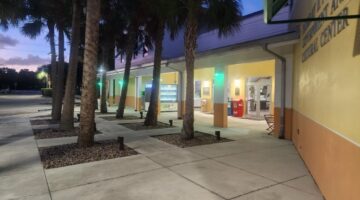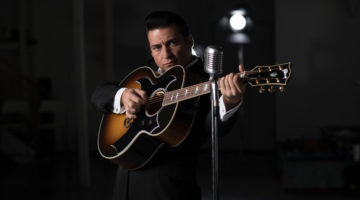PHOTO/ MARK HOWELL
Lawrence Ferlinghetti in the grounds of the Porter Mansion, mid-1990s.
Spontaneous bop encounters with the Beats
KONK LIFE STAFF WRITER
I first came across the Beats in boarding school at the age of 16, thanks to my English teacher, Mr. Greenwood, who recognized some incipient beatness in me and recommended I read a book called “On the Road” by Jack Kerouac.
I immediately purchased the paperback edition just published in Britain by Pan Books and encountered Kerouac’s spontaneous bop prosody. It switched on a light in me that has never gone out.
My first encounter with a living Beat legend was here in Key West, as a reporter for the late, legendary Jerry Montgomery, publisher of Island Life.
Lawrence Ferlinghetti was paying a visit to Key West in the mid-1990s and accepted an invitation by Jeanne Porter, whom he’d first met when stationed in the late 1940s as a trainee at the submarine base, to stay at the Porter Mansion on Caroline Street.
On this visit five decades later, he had the opportunity to renew his friendship with Jeanne, by then a portly grand dame of the city’s literary and society scene.
I interviewed the author of “A Coney Island of the Mind” and owner of San Francisco’s City Lights Bookstore in the garden of Jeanne’s grand home on Caroline Street. We sat on a pair of benches that faced each other between a fish pond and the Frost Cottage.
Ferlinghetti offered me a fine gift, a poem he’d spontaneously written that morning on a walk about the Key West cemetery. Then he confessed to me that he’d had quite a crush on Jeanne Porter while training at the sub base. He recalled dancing with her at the Porter mansion on more than one occasion at parties that her family had held there; they’d become rich and famous after her great-grandfather had developed an isolation program for those suffering from yellow fever and other diseases in the tropics.
Ferlinghetti remembered Jeanne as coquettish and intelligent and they managed to maintain a long-distance friendship over the years. She died not long after this last Key West visit of his.
In the interview, we talked about Jack Kerouac, because Ferlinghetti wanted to. He said Jack’s language had the echo of a train’s horn across the prairies, a longing being heard by many readers in many lands. And then, inevitably, he spoke of Jack’s mother as famously both help and hindrance to him as surely as was his alcoholism.
Allen Ginsberg is the other great legend among the Beats whom I got to know personally, starting when I was a student at Cambridge University.
The late author of “Howl” visited Britain on a number of occasions and I met him there on two of those visits. I believe his most productive trip to the British Isles was probably in 1967, when he wrote “Wales Visitation” on a visit to Capel-y-ffin in the Brecon Beacons, not far from where I spent a lot of my childhood. This is the poem that includes the immortal lines: “A solid mass of Heaven, mist-infused, ebbs thru the vale, a wavelet of immensity, lapping gigantic through Llanthony Valley, valley upon valley under Heaven’s ocean.”
Sounds like home to me.
But the big time I first met him was when he came to Cambridge to give a reading.
We were all beside ourselves in anticipation of this visitation by Ginsberg, including a friend of mine visiting from Yorkshire known as Murphy. He and I were making our way along Trumpington Street when I spied the unmistakable form of bearded Ginsberg. We paced brazenly ahead to introduce ourselves. He stared astonished at me through huge spectacles when I came to my last name. “No, no, not Howl,” I explained, “but Howell.” “Same root!” he exclaimed. “From the Welsh, ‘hwl.’ It means longing.”
He longingly stared at us. “I was heading to the Fitzwilliam to see the William Blake archive. Let’s get lost instead. Take me somewhere!”
So we drove him in Murphy’s car to Ely Cathedral, a great Norman pile not far from town. He gaped at it in awe, up and down, inside and out. Occasionally another visitor would approach him for an autograph “for our daughter” (Ginzy had been on TV the night before.)
On our way back to Cambridge in time for his reading, he chanted Om and drank in the countryside. Then he’d ask a question or two. “What do you want in life, Howell?”
I was nonplussed, the question was way too big.
“I dunno,” I said. “Power, I guess.” (That was a word being heard more and more in universities everywhere as the Vietnam war went on and on.) “Power?! You know what power is? Ely Cathedral is power. Those twisted brick chimneys on that old farmhouse over there, that’s power.”
I encountered Ginsberg a number of other times and in other places over the years. On a trip to London in the early 1970s to visit William Burroughs, I met him at a publishing party where he wore a T-shirt listing the American dead in Vietnam (hundreds of names in tiny type) and was wearing crutches from a slip and fall. Despite the sprained ankle, he gave me one of the crutches so he could take of hold my two year-old son, Rafael (middle name Cassady). “After Neal?” he asked. Yup,” I nodded. “He’s a beautiful boy,” said the poet. Rafe began to cry at this so I took him back and he quieted down and began staring at this hairy fellow in front of him and began to smile.
“So, I see you found your power, then?” Ginsberg said to me, smiling to himself. It was a lovely moment. And as has become obvious, I never ever forgot my spontaneous bop encounters with the Beats.
[livemarket market_name="KONK Life LiveMarket" limit=3 category=“” show_signup=0 show_more=0]




No Comment